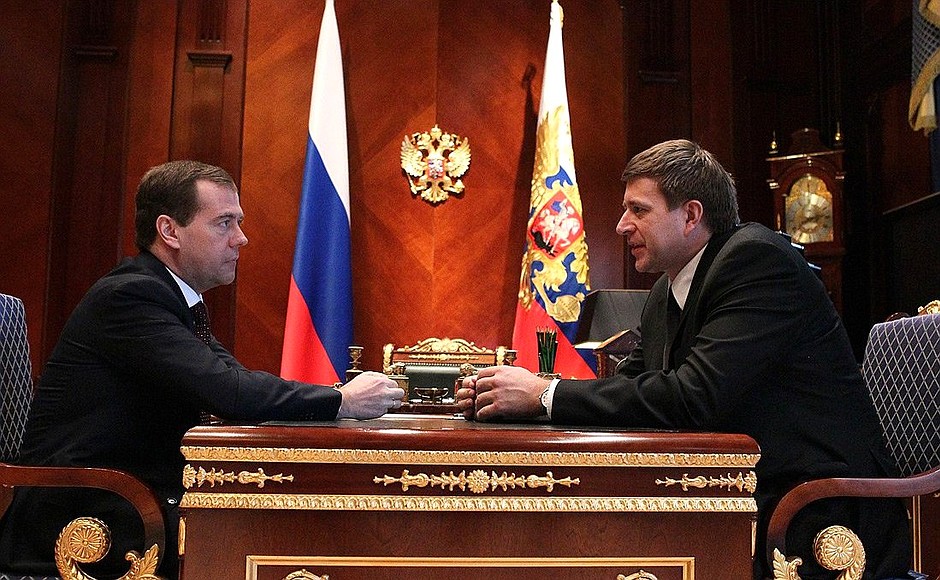
Alexander Konovalov is in charge of the working group finalising the new edition of the Civil Code.
* * *
President of Russia Dmitry Medvedev: Good afternoon.
Mr Konovalov, in November I issued instructions putting you in charge of the working group finalising a new edition of the Civil Code. At the time there were different approaches to the matter, which emerged both among those who were previously engaged in the work on the Civil Code and among certain other groups of contributors. Now I would like you to report on the results, because the deadline for finalising the document was February 1, 2012.
Minister of Justice Alexander Konovalov: Mr President, a working group was set up per your instructions, and includes the developers of the draft amendments to the Civil Code, as well as all specialists involved in this process, including experts from the Economic Development Ministry and representatives of the legal community. In other words, a very wide and representative panel of experts has been involved in this discussion, which gives us confidence that the outcome will reflect all that is best in the Russian legal practice and legal thinking at present.
The discussion was indeed challenging but extremely constructive. I would like to express my appreciation for the developers of the Civil Code, who have produced a very substantial fundamental document that is essentially based on the 15-years’ experience of applying the new civil legislation in Russia.
In this time the Civil Code, whose first part was adopted in 1995, had been substantiated by a very serious volume of legal practice and new approaches, and these new approaches, the new fabric of civil law enforcement, became embodied in the amendments to the Civil Code.
At the same time, I would like to give credit to those who criticised the project and made suggestions, some of which were quite revolutionary and radical. On the whole, in our view, we were able to find a balance between the radical and conservative approaches, and as a result the document became more just and, in our opinion, is ready to be submitted to the Parliament. We can recommend it.
I would like to note that the amendments to the Civil Code are on a very wide range of issues. In many respects they can now facilitate, improve and optimise legal relations in the country. This applies both to defending the integrity of participants in legal relations, safeguarding creditors’ interests and protecting property rights. Another important aspect is that a very broad range of titles and property ownerships, new opportunities in exercising the rights of title holders and owners of various types of property have been added to the Civil Code.
If this draft law is passed and becomes part of the Civil Code, there is no doubt that the interests of proprietors, interests of investors and creditors will be protected in Russia in a substantially more reliable, modern and more correct way than they are now.
”The drafting of the new edition of the Civil Code is a very important step in the development of civil law, and generally strengthening the legal basis for doing business in our country.“
A considerable contribution was made to legally ensure the contractual rights and liabilities, the property transactions, deals and contracts – that is, everything that constitutes economic relationships in Russia today. With regard to Russia’s economic interests, it is an extremely important step for investors in the Russian economy, both domestic and foreign.
This is a very important signal, which offers new judicial and legal opportunities for the benefit of those who are investing and are engaged in business in Russia. I repeat, however, that the Civil Code will not only benefit the business community; it will create new opportunities and a comfortable environment to effectively exercise their rights for all people living their ordinary, normal lives.
Dmitry Medvedev: The Civil Code, or as it is sometimes referred to, the “economic constitution”, is a vitally important and very sophisticated document. Therefore, it is imperative that the Civil Code acquires a new dimension, bearing in mind the changing economic environment and the development of our country and taking into account the challenges our state faces today. I am referring both to large projects, such as the creation of an international financial centre in our country, and our common mission to improve the investment climate.
The matter you have reported on today, the drafting of the new edition of the Civil Code on a wide variety of issues, is indeed a very important step in the development of civil law, and generally strengthening the legal basis for doing business in our country, and protecting the ordinary property interests of our citizens, including the fundamental institutions, such as property rights and contractual law.
I hope that in this form this document will play a role in ensuring a dynamic development of our economy, and at the same time maintaining the traditions that were inherent in our legal system over the last 200 years.
I hope that all the details will be finalised in the near future, and I will submit it to the State Duma for consideration.
